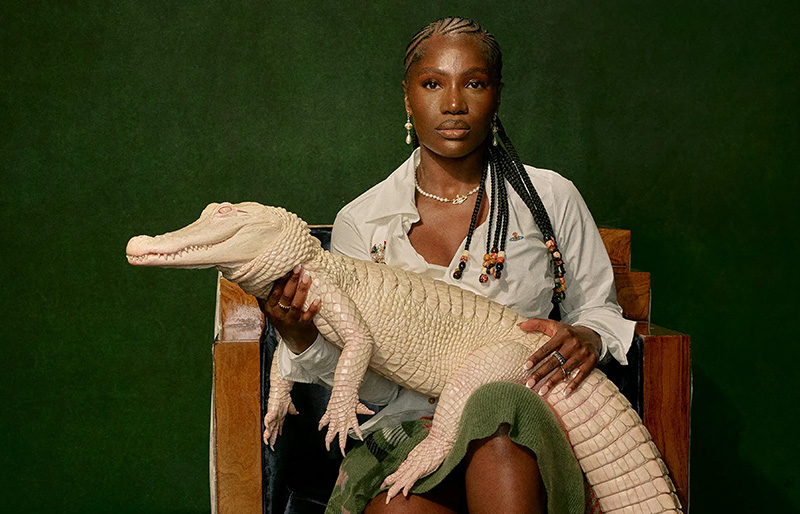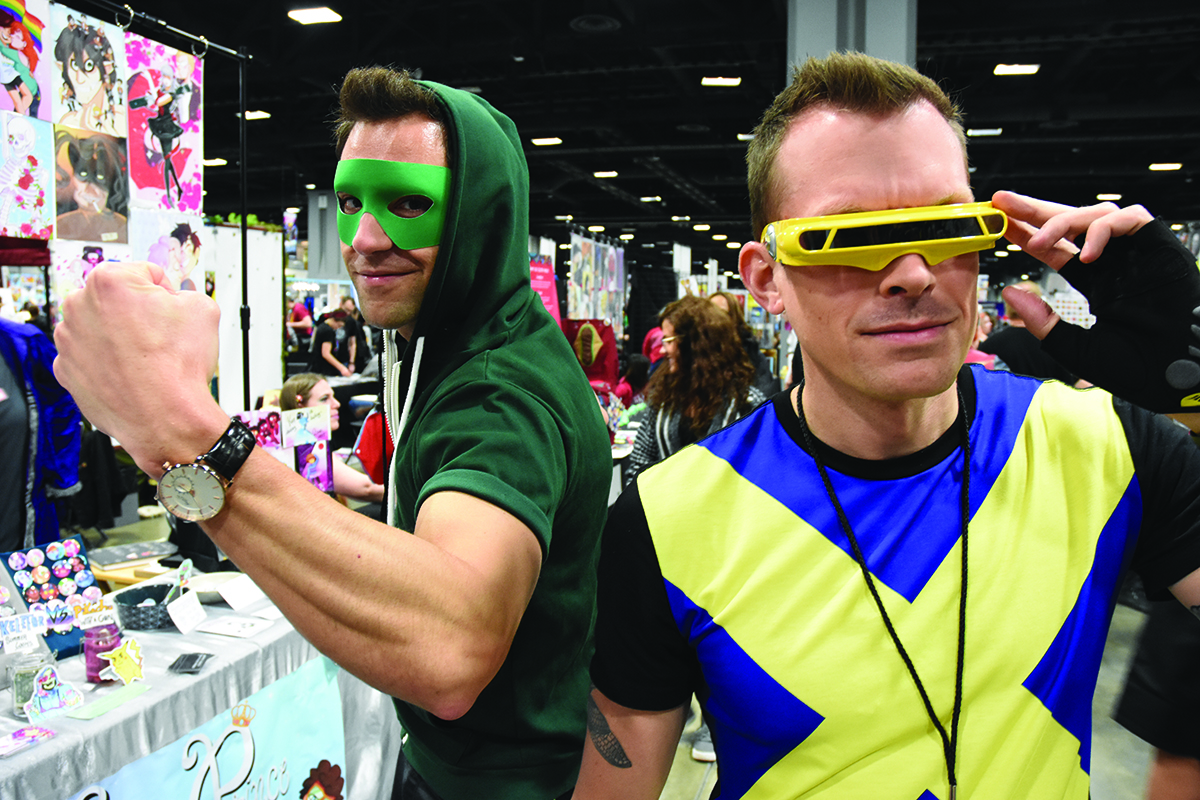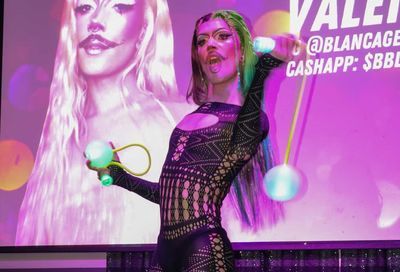Pride + Vote = Power
The 2004 Capital Pride Theme
“Rock the vote.”
“Every vote counts.”
“Choose or lose.”
“Vote as if your life depended on it.”
Each election cycle we hear the admonishments. From junior high civics classes to television public service announcements, we’re used to being reminded of our duty in a democratic society: You have to vote to make the system work.
Then, come election day, forty percent of the country take a pass and skip the whole voting thing. At least that’s what they did in the last election, according to U.S. Census Bureau. And as the nation learned from the vote-counting drama in Florida, a national race can still come down to what amounts to a handful of votes.
While every election is important, certain issues can make some elections even more pressing. The 2004 election looms large nationally, locally and at every level in between for gay, lesbian, bisexual and transgender persons. That’s why Capital Pride 2004 has chosen to make “Pride + Vote = Power” the overarching theme for this year’s celebration.
“This year’s pride celebration is probably one of the most important we’ve had since the early seventies in the post-Stonewall era,” says A. Cornelius Baker, Executive Director of the Whitman-Walker Clinic, the sponsoring organization for Capital Pride. “It really is important for all of us to be out in the streets and showing our elected leaders that we are here and a part of the fabric of our community. We deserve our dignity, we deserve respect, and we deserve full citizenship.”
Marriage, of course, looms large over this year’s Capital Pride, with the Federal Marriage Amendment being pushed by opponents of marriage equality and GLBT civil rights. While national organizations are lobbying, fundraising and coordinating efforts to defeat that amendment, it’s also important for the community to send messages to the government — and given the location of Capital Pride, it’s an excellent place to deliver a message.
“If anything, people look to D.C.,” says Capital Pride Director Robert York. “Capital Pride is a way for our community to be out there in front of the Congress and in front of the White House.”
Such a message has to become action for more than one day as well, adds Baker.
“We have to be committed all summer long and right up to November 2. We have to register to vote if we haven’t. We have to tell our friends and family how important it is to vote, and let those people running for office know that our issues and our lives are important, and we will carry them into the voting booth with us.”
That message will be sent throughout the week of Capital Pride, but most noticeably during Sunday’s Pride Festival on Pennsylvania Avenue, where singers, performers, politicians and activists will all take the stage to stir and excite the crowds.
Some occasional dancing may occur as well.
But even as crowds celebrate, they’ll be reminded of the importance of the day. One of the festival’s speakers will be Wes Culwell, best known to gay audiences for his stint as the star of the first gay reality dating series, Boy Meets Boy. Culwell actually got his start in gay activism well before his television debut, working to defeat Prop. 22, the Pete Knight initiative to ban gay marriage in California, and later in development for the San Diego LGBT Community Center. What’s changed since then is the scale he’s working on.
“About ninety-five percent of my work post-show is advocacy, speaking on college campuses, and those things,” says Culwell. “It’s taken my local activism to a national level.”
Taking into account the Federal Marriage Amendment and other anti-gay efforts, Culwell encourages everyone to take the anti-gay effort very seriously and vote accordingly
“People never thought Prop. 22 would pass and they didn’t vote. It passed overwhelmingly,” he says. “I think this election is the time we have to realize we have power. We have to use it in the election, and that means getting rid of the current administration.”
Culwell, who notes that he enjoys D.C. because you can have engaging political conversations with people you meet just about anywhere, is looking forward to talking about the importance of not only getting out the vote, but getting GLBT youth involved in the community both as voters and supporters.
Baker also points to youth as one of the many important reasons for the community to maintain a high level of political action and voting throughout the year, saying that the community must work to ensure that “no gay child in any school in any school or community should be bullied or shunned.”
The list of issues may sound daunting, but they all call for attention from the community and from government leaders.
“We need to pay attention to the healthcare concerns of the GLBT community. We need more leadership from the government on the crystal meth epidemic, more leadership on lesbian health, and more leadership so that transgender persons can be safe and have opportunities for employment.”
Baker and York both stress the continued importance of HIV/AIDS and the need for continued political activism.
That’s the message Matthew Cusick will bring to the festival stage.
Cusick, who was fired from world-famous Cirque de Soleil performance group because he was HIV positive, recently won a settlement with the company. A native of the Washington area, he’s been traveling around the country sharing his story to remind businesses and individuals that discrimination still exists, and can arise in the most unexpected ways.
“HIV discrimination still happens every day,” he says, stressing the importance of voting for leaders committed to fighting HIV/AIDS and ending discrimination.
“People have become a little more complacent about it. It’s not talked about as much any more. The perception is that people are living with it, and it’s not such a horrible disease.”
That’s a misperception, says Cusick. While people can live productive lives with HIV, the treatment regimens and other health implications are “not fun to live with.”
Baker says that with anti-gay initiatives sprouting across the country and reductions in funding and support threatening programs for GLBT health programs, it’s vital the community stay informed.
“I don’t think there’s anyone reading the news today who can feel complacent seeing our lives debated on TV.”
And it’s not just federal elections the community should focus on.
“Many of the issues we’re talking about — GLBT health, safe schools, police and the prevention of violence against transgender — are [for] locally elected officials,” says Baker. “Our voting doesn’t stop with the federal government. It’s about our state and local governments, it’s about our city commissions.
“We must vote for every office that affects our lives and we must vote at every opportunity that we have.”
Support Metro Weekly’s Journalism
These are challenging times for news organizations. And yet it’s crucial we stay active and provide vital resources and information to both our local readers and the world. So won’t you please take a moment and consider supporting Metro Weekly with a membership? For as little as $5 a month, you can help ensure Metro Weekly magazine and MetroWeekly.com remain free, viable resources as we provide the best, most diverse, culturally-resonant LGBTQ coverage in both the D.C. region and around the world. Memberships come with exclusive perks and discounts, your own personal digital delivery of each week’s magazine (and an archive), access to our Member's Lounge when it launches this fall, and exclusive members-only items like Metro Weekly Membership Mugs and Tote Bags! Check out all our membership levels here and please join us today!
























